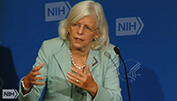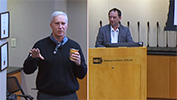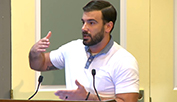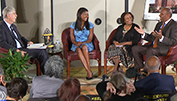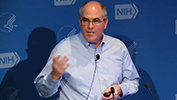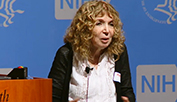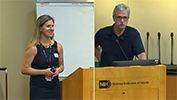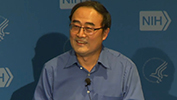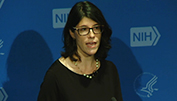-
- NIH VideoCast - National Research Summit on Care, Services and Supports for Persons with Dementia and Their Caregivers (Day 1)
-
- - Division of Behavioral and Social Research, National Institute on Aging, NIH (2017/10/19)
- - Category : Conferences
- The goal of this research summit is to identify what we know and what we need to know in order to accelerate the development, evaluation, translation, implementation, and scaling up of comprehensive care, services, and supports for persons with dementia, families, and other caregivers. The summit is focused on research that is needed to improve quality of care and outcomes across care settings, including quality of life and the lived experience of persons with dementia and their caregivers.
For more information go to https://aspe.hhs.gov/national-research-summit-care-services-and-supports-persons-dementia-and-their-caregivers
NIH VideoCast - National Research Summit on Care, Services and Supports for Persons with Dementia and Their Caregivers (Day 1)
-
- NIH VideoCast - Facts and Uncertainties: Science and the Practice of Medicine
-
- - Josephine P. Briggs, M.D., Director, National Center for Complementary and Integrative Health, NIH (2017/10/19)
- - Category : Special
- Annual Maurice B. Burg Lecture.
Josephine P. Briggs, M.D., director of the National Center for Complementary and Integrative Health (NCCIH), will present the Maurice B. Burg Lecture, titled "Facts and Uncertainties: Science and the Practice of Medicine." The event will also be videocast live on the Web.
In addition to her leadership of NCCIH, Dr. Briggs was the former interim director of the NIH Precision Medicine Initiative?? Cohort Program, a new model of patient-powered research that promises to accelerate biomedical discoveries and provide clinicians with new tools, knowledge, and therapies to select which treatments will work best for which patients. She is also co-leader of the NIH Common Fund Health Care Systems Research Collaboratory, a 5-year effort to conduct pragmatic clinical trials in partnership with clinical investigators and health care systems in the United States. Dr. Briggs is also a member of the NIH Steering Committee, the most senior governing board at NIH, and serves as a member of the NIH Scientific Management Review Board. She also is on the Executive Committee of the NIH Pain Consortium. In the past, she served as Acting Director of the Division of Clinical Innovation at the newly established National Center for Advancing Translational Sciences.
NIH VideoCast - Facts and Uncertainties: Science and the Practice of Medicine
-
- NIH VideoCast - TRACO 2017: Lymphoma and Small molecules
-
- - John T. Schiller, Ph.D., CCR, NCI, NIH and Anton Simeonov, Ph.D., NCATS, NIH (2017/10/19)
- - Category : TRACO
- Translational Research in Clinical Oncology (TRACO)
Recent advances in understanding cancer biology are beginning to be translated into improvements in diagnosis and treatment of cancer. In the post-genome era, we increasingly rely on strong collaboration between basic and clinical scientists to develop novel approaches for treatment of human disease. The NCI Center for Cancer Research (CCR) is one of the largest cancer research organizations in the world, with more than 200 principal investigators, and has played a major role in developing and implementing many new technologies, such as nanotechnology, next generation sequencing, genomics and proteomics.
For more information go to http://ccr.cancer.gov/training/trainee-resources/courses-workshops/traco
NIH VideoCast - TRACO 2017: Lymphoma and Small molecules
-
- NIH VideoCast - NIH Disability Employee Awareness Program 2017
-
- - NIH (2017/10/18)
- - Category : Disability
- National Disability Employment Awareness Month (NDEAM) is celebrated in recognition of the historical and cultural contributions of persons with disabilities. This year???s national theme is ???Inclusion Drives Innovation.??? The theme promotes the benefits of a united and diverse biomedical workforce by encouraging innovation through the lens of diversity and inclusion.
At NIH, we continually strive to serve as a model employer of those with disabilities. We use this time to address challenges that affect their employment and focus on strategies for recruitment and retention. NIH stands ready to continue partnering with leadership, employees, and others to develop innovative policies and practices to recruit and retain people with disabilities and targeted disabilities. We stand together as an agency as we broaden our research and increase our level of awareness.
I encourage everyone to show support for the panel discussion, Hiring and Retention of People with Disabilities and Targeted Disabilities. The panelists will identify best practices, recruitment strategies, partnership opportunities, and tools for strengthening the NIH workforce for people with disabilities. Additionally, a ???What Can You Do??? campaign will be introduced to NIH. This campaign focuses on ways for all NIH staff to make a positive impact on the issue of disability employment. Specifically, it will focus on strategies to improve the workforce, such as focusing on creativity and innovation of employees with disabilities.
Let us celebrate the achievements of people with disabilities in the workplace every day, not just during the month of October. To learn more about the National Disability Employment Awareness Month campaign ???What Can You Do,??? please contact Alma McKune, Office of Equity, Diversity, and Inclusion, at 301-496-4547, or visit the website at http://edi.nih.gov/pwd and follow EDI on Twitter and Instagram at @NIH_EDI. When tweeting, include ???#InclusionDrivesInnovation??? in your tweet.
NIH VideoCast - NIH Disability Employee Awareness Program 2017
-
- NIH VideoCast - National Advisory Eye Council - October 2017
-
- - National Eye Institute, NIH (2017/10/17)
- - Category : Advisory Board Meetings and Workshops
- Paul A. Sieving, MD, PhD, the Director of the National Eye Institute (NEI), presides as Chair and Paul A. Sheehy, Ph.D., as Executive Secretary to the National Advisory Eye Council (NAEC). The meeting is open to the public from 08:30 a.m. until 12:35 p.m. then the meeting will be closed to the public for the review of confidentiality and conflict of interest procedures and a review of grant and cooperative agreement applications on visual disorders, preservation of sight, and the special health problems and requirements of individuals with visual impairments. It also conducts the second level peer review of grant applications.
For more information go to https://nei.nih.gov/about/naec
NIH VideoCast - National Advisory Eye Council - October 2017
-
- NIH VideoCast - Sensory Molecules and Mechanisms in Worms
-
- - William Schafer, Ph.D., University of Cambridge (2017/10/17)
- - Category : Neuroscience
- NIH Neuroscience Series Seminar
The fundamental nature of mental phenomena such as perception, learning and memory is one of the remaining scientific mysteries. Since the neuroanatomy of mammalian nervous systems is exceedingly complex and incompletely characterized, it is difficult to understand mechanistically how the human brain works at the level of molecules and cells. However, in simpler organisms like the nematode C. elegans, obtaining a reductionist understanding of nervous system function and behaviour is a tractable problem.
Aspects of nervous system function in which Dr. Schafer???s lab is investigating in C. elegans include mechanosensation: how do neurons sense stimuli such as touch and pain, and how do sensory circuits integrate and process this information. They are also interested in behavioural states: how do contextual cues such as satiety and the presence of food influence behaviour through defined neural circuits, and what roles do molecules like dopamine, serotonin and neuropeptides play in these processes.
For more information go to https://neuroscience.nih.gov/neuroseries/Home.aspx
NIH VideoCast - Sensory Molecules and Mechanisms in Worms
-
- NIH VideoCast - Fireside Chat Honoring Congressman Louis Stokes
-
- - Dr. Francis S. Collins, NIH Director and the family of former U.S. Congressman Louis Stokes (2017/10/14)
- - Category : Special
- NIH Director Dr. Francis S. Collins and the family of former U.S. Congressman Louis Stokes will have an intimate conversation about the life and legacy of the Congressman, in recognition of his autobiography, The Gentleman from Ohio.
Known as a stalwart for social justice, Congressman Stokes dedicated his life to serving others, particularly minority and underserved communities. Born in 1925, Stokes grew up in an impoverished neighborhood with his younger brother and widowed mother. He served in the U.S. Army during World War II. After his military service, he earned an undergraduate degree from Western Reserve University and a law degree from the Cleveland-Marshall College of Law. Mr. Stokes was elected to Congress in 1968 to represent the 21st Congressional District of Ohio and, over his 30-year career, he went on to become one of the most effective legislators and a friend to NIH.
As a Member of Congress on the House Appropriations Committee, Congressman Stokes supported increases in funding for biomedical research and was a persistent and emphatic champion of extending the benefits of biomedical research to all people, especially in the area of health disparities. In 1990, Stokes was instrumental in launching NIH???s Office of Minority Programs, later named the Office of Research on Minority Health. Over the years, he pushed for its elevation to Institute status. In recognition for his leadership and tremendous support in making health disparities a research priority, NIH dedicated the Louis Stokes Laboratories to Congressman Stokes.
NIH VideoCast - Fireside Chat Honoring Congressman Louis Stokes
-
- NIH VideoCast - CC Grand Rounds: Contemporary Clinical Medicine: Great Teachers: Learning from Patients (Again): Statin-triggered Autoimmune Myopathy
-
- - Andrew Mammen, MD, PhD, Investigator, Muscle Disease Unit, Laboratory of Muscle Stem Cells and Gene Regulation, NIAMS, NIH and Adjunct Professor of Neurology and Medicine, Johns Hopkins University School of Medicine (2017/10/13)
- - Category : Clinical Center Grand Rounds
- CC Grand Rounds: Contemporary Clinical Medicine: Great Teachers: Learning from Patients (Again): Statin-triggered Autoimmune Myopathy
For more information go to http://www.cc.nih.gov/about/news/grcurrent.html
NIH VideoCast - CC Grand Rounds: Contemporary Clinical Medicine: Great Teachers: Learning from Patients (Again): Statin-triggered Autoimmune Myopathy
-
- NIH VideoCast - Systemic immunity protects the mind: Can immune checkpoint blockade combat Alzheimer???s disease?
-
- - Michal Schwartz, Ph.D., Professor of Neuroimmunology, Weizmann Institute of Science (2017/10/13)
- - Category : WALS - Wednesday Afternoon Lectures
- NIH Director`s Wednesday Afternoon Lecture
It is now widely accepted that immune surveillance is required for supporting brain functional plasticity and repair. Participating cells include the microglia, the resident myeloid immune cells of the brain, circulating monocytes, and CD4+ T cells. Over the years, we demonstrated that leukocytes supporting the brain can gain access to the brain through a unique compartment within the brain territory, the chroid plexus epithelium (CP) at the blood-cerebrospinal fluid-barrier (B-CSF-B), remote from the brain parenchyma. The CP serves as a selective gateway allowing leukocyte entry to the CNS; its activity is controlled by its cytokine milieu, and specifically by IFN-g. We showed that in mouse models of aging and in Alzheimer???s disease (AD), this interface is suppressed in its ability to allow communication between the brain and the circulating leukocytes. We further found that transiently relieving systemic immune suppression could enhance recruitment of disease-modifying leukocytes to sites of brain pathology. Unleashing the immune system could be achieved by blocking inhibitory immune checkpoints, regulatory pathways that normally maintain systemic immune homeostasis and tolerance. Specifically, we found in three mouse models of AD that targeting the inhibitory checkpoints, PD-1/PD-L1 pathway, was effective in reversing cognitive loss, reducing brain inflammation, and mitigating disease pathology. In addition, our emerging understanding of the fate of microglia in AD, based on single cell immunogenomics, has revealed a role of microglia in combating the disease, and suggests that boosting systemic immunity modifies microglial activity. Overall, our results indicate that targeting the immune system rather than brain-specific disease-escalating factors may provide a multi-dimensional therapy for AD.
For more information go to https://oir.nih.gov/wals/2017-2018/systemic-immunity-protects-mind-can-immune-checkpoint-blockade-combat
NIH VideoCast - Systemic immunity protects the mind: Can immune checkpoint blockade combat Alzheimer???s disease?
-
- NIH VideoCast - The IL-23-Th17 Immune Axis: From Bench to Bedside
-
- - Dan Cua, Ph.D., Senior Principal Scientist, Immuno-Oncology Discovery, Merck (2017/10/13)
- - Category : Immunology
- Immunonology Interest Group Seminar
Following the discovery of IL-23-dependent T cell immunity, the past decade has witnessed a major revision of the T-helper subset paradigm and substantial progress has been made in deciphering the molecular mechanisms of T cell lineage commitment and function. Our recent work focused on the transcriptional control of Th17 cell development, as well as the protective versus pathogenic roles of IL-17 and IL-22 in mucosal tissues. I will discuss the concept of immune ???counter-regulation??? during organ-specific tissue inflammation. I will also highlight recent clinical data demonstrating that neutralization of IL-17 and IL-23 are remarkably effective for treating immune-mediated inflammatory diseases.
NIH VideoCast - The IL-23-Th17 Immune Axis: From Bench to Bedside
-
- NIH VideoCast - TRACO 2017: Radiation oncology and Topoisomerase
-
- - Elizabeth Nichols, MD, University of Maryland Medical Center and Yves Pommier, M.D., Ph.D., Center for Cancer Research, NCI, NIH (2017/10/12)
- - Category : TRACO
- Translational Research in Clinical Oncology (TRACO)
Recent advances in understanding cancer biology are beginning to be translated into improvements in diagnosis and treatment of cancer. In the post-genome era, we increasingly rely on strong collaboration between basic and clinical scientists to develop novel approaches for treatment of human disease. The NCI Center for Cancer Research (CCR) is one of the largest cancer research organizations in the world, with more than 200 principal investigators, and has played a major role in developing and implementing many new technologies, such as nanotechnology, next generation sequencing, genomics and proteomics.
For more information go to http://ccr.cancer.gov/training/trainee-resources/courses-workshops/traco
NIH VideoCast - TRACO 2017: Radiation oncology and Topoisomerase
-
- NIH VideoCast - Ethical and Regulatory Aspects of Clinical Research Session 3: Risks and Benefits, Research with Pregnant Women and Research Participant Panel
-
- - NIH Clinical Center Department of Bioethics (2017/10/12)
- - Category : Bioethics
- The Department of Bioethics offers this seven to eight week course annually each fall. The course is designed to provide an overview of the important issues in the ethics of human subject research for clinical investigators and others who participate in the conduct of research and is open to the entire NIH community as well as to those from outside NIH. Topics include the history of human subject research ethics, principles and guidelines, study design, subject recruitment, informed consent, and international research. The course is open to the entire NIH community as well as to those from outside NIH. The recommended textbook is Ethical and Regulatory Aspects of Clinical Research, edited by Emanuel et al (Johns Hopkins University Press). The course is taught by guest faculty and faculty members from the National Institutes of Health. This is a required academic program for Bioethics fellows.
NIH VideoCast - Ethical and Regulatory Aspects of Clinical Research Session 3: Risks and Benefits, Research with Pregnant Women and Research Participant Panel
-
- NIH VideoCast - National Advisory Council for Complementary and Integrative Health (NACCIH) ??? October 2017
-
- - NCCIH, NIH (2017/10/11)
- - Category : Advisory Board Meetings and Workshops
- This is the Open Session of the 64th meeting of the National Advisory Council for Complementary and Integrative Health. The agenda for this Open Session includes presentations from Josephine Briggs, MD, David Shurtleff, PhD, and an interagency panel on the National Pain Strategy in relationship to the Prescription Opioid Epidemic.
For more information on NCCIH and the NACCIH, see:
https://nccih.nih.gov/about/naccih
NIH VideoCast - National Advisory Council for Complementary and Integrative Health (NACCIH) ??? October 2017
-
- NIH VideoCast - The development and Function of Regulatory T cells
-
- - Wanjun Chen, M.D., Senior Investigator, Chief, Mucosal Immunology Section, NIDCR, NIH (2017/10/06)
- - Category : Immunology
- Immunology Interest Group Seminar Series
Dr. Chen???s research focuses on elucidating mechanisms of T-cell immunity and tolerance and manipulating T-cell immunity versus tolerance in animal models to understand the pathogenesis of and develop immunotherapy for autoimmunity, cancer and infectious diseases. Among his many scientific contributions to biomedical research, Dr. Chen is the first to discover that TGF-beta induces Foxp3 gene in naive CD4+ T cells and converts them into regulatory T cells (iTregs, pTregs). The paper describing this finding has been cited for more than 4000 times. He has also demonstrated that TGF??? controls the development of Foxp3+ Tregs in the thymus (tTregs) and has been working to translate the knowledge acquired from basic mechanistic studies into disease prevention and treatment. His lab has recently discovered a way to induce autoantigen-specific regulatory T cells in vivo in experimental models of autoimmunity including EAE, type I diabetes, EAU and rheumatoid arthritis. Most recently, Dr. Chen discovered that D-mannose has a surprising therapeutic effect on experimental diabetes and asthma. Dr. Chen has published more than 100 peer-reviewed articles in internationally prestigious journals including Nature, Nature Medicine, Nature Immunology, Immunity, J. Exp. Med., PNAS, Science Translational Medicine, Cell Stem Cell, etc., and been invited to speak at many international meetings and universities around the world. Dr. Chen has received many honors and awards, including the Scientific Achievement Award from the NIH Asian and Pacific Islander American Organization and the Wang Ying-Lai Memorial Lecturer. He was also a former president of the Society of Chinese Biologists at America (SCBA) Washington-DC-Baltimore Chapter.
NIH VideoCast - The development and Function of Regulatory T cells
-
- NIH VideoCast - Ethical and Regulatory Aspects of Clinical Research Session 2: IRBs, the Common Rule, and Subject Selection
-
- - Sara Chandros Hull, PhD, CC, NIH and NHGRI, NIH, Yvonne Lau, MBBS, MBHL, PhD, OHRP, HHS and David Wendler, PhD, CC, NIH (2017/10/05)
- - Category : Bioethics
- The Department of Bioethics offers this seven to eight week course annually each fall. The course is designed to provide an overview of the important issues in the ethics of human subject research for clinical investigators and others who participate in the conduct of research and is open to the entire NIH community as well as to those from outside NIH. Topics include the history of human subject research ethics, principles and guidelines, study design, subject recruitment, informed consent, and international research. The course is open to the entire NIH community as well as to those from outside NIH. The recommended textbook is Ethical and Regulatory Aspects of Clinical Research, edited by Emanuel et al (Johns Hopkins University Press). The course is taught by guest faculty and faculty members from the National Institutes of Health. This is a required academic program for Bioethics fellows.
NIH VideoCast - Ethical and Regulatory Aspects of Clinical Research Session 2: IRBs, the Common Rule, and Subject Selection
-
- NIH VideoCast - Top-down mass spectrometric analysis of histone modifications
-
- - Dr. Benjamin Garcia, University of Pennsylvania (2017/10/05)
- - Category : Proteomics
- ProtIG Lecture
ProtIG is an NIH Special Interest Group (SIG) that organizes seminars and workshops in relevant areas of proteomics, including talks on separation and protein identification methods, determination of post-translational modifications, protein-protein interactions, and bioinformatics and data management.
NIH VideoCast - Top-down mass spectrometric analysis of histone modifications
-
- NIH VideoCast - Ethics Rounds: Research on Pediatric Biospecimens: Is Reconsent Necessary?
-
- - Discussant: Jonathan Berg MD, PhD Associate Professor, Genetics, University of North??Carolina School of Medicine at Chapel Hill and Case Presenters: Robert Tamburro, MD, MSc Medical Officer, Pediatric Trauma and Critical Illness Branch Eunice Kennedy Shriver??National Institute of??Child Health and Human Development, NIH and Benjamin Berkman, JD, MPH NIH Department of Bioethics Deputy Director, Bioethics Core, NHGRI, NIH (2017/10/05)
- - Category : Clinical Center Grand Rounds
- Ethics Rounds: Research on Pediatric Biospecimens: Is Reconsent Necessary?
For more information go to http://www.cc.nih.gov/about/news/grcurrent.html
NIH VideoCast - Ethics Rounds: Research on Pediatric Biospecimens: Is Reconsent Necessary?
-
- NIH VideoCast - TRACO 2017: Prostate cancer and TGF beta
-
- - Ravi A. Madan, M.D., National Cancer Institute, NIH and Sonia B. Jakowlew, Ph.D., National Cancer Institute, NIH (2017/10/04)
- - Category : TRACO
- Translational Research in Clinical Oncology (TRACO)
Recent advances in understanding cancer biology are beginning to be translated into improvements in diagnosis and treatment of cancer. In the post-genome era, we increasingly rely on strong collaboration between basic and clinical scientists to develop novel approaches for treatment of human disease. The NCI Center for Cancer Research (CCR) is one of the largest cancer research organizations in the world, with more than 200 principal investigators, and has played a major role in developing and implementing many new technologies, such as nanotechnology, next generation sequencing, genomics and proteomics.
For more information go to http://ccr.cancer.gov/training/trainee-resources/courses-workshops/traco
NIH VideoCast - TRACO 2017: Prostate cancer and TGF beta
-
- NIH VideoCast - Turning Discovery into Health: The Contributions of Economic Research (Day 2)
-
- - NIH (2017/10/03)
- - Category : Advisory Board Meetings and Workshops
- The Health Economics Common Fund Program at the National Institutes of Health (NIH) has supported research to understand how innovations in treatments, diagnosis, and preventive strategies can be most effectively deployed to improve health and well-being. Research supported by this program identifies factors determining adoption of effective health technologies, innovations, and discoveries, so that past and future investments by NIH may have greater public health impact.
In recognition of its last year, the Health Economics Common Fund Program is sponsoring a research symposium titled Turning Discovery into Health: The Contributions of Economic Research on September 28-29, 2017 on the NIH Main Campus. The goals of this program-culminating event are to highlight results from Common Fund supported projects and to stimulate ideas for future contributions of economic methods to the NIH and Institute-specific missions.
For more information go to http://www.roseliassociates.com/HealthEcon2017
NIH VideoCast - Turning Discovery into Health: The Contributions of Economic Research (Day 2)





